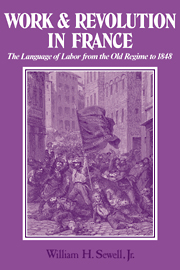Book contents
- Frontmatter
- Contents
- Preface
- 1 INTRODUCTION: SOCIAL HISTORY AND THE LANGUAGE OF LABOR
- 2 MECHANICAL ARTS AND THE CORPORATE IDIOM
- 3 JOURNEYMEN'S BROTHERHOODS
- 4 THE ABOLITION OF PRIVILEGE
- 5 FROM GENS DE MÉTIER TO SANS-CULOTTES
- 6 A REVOLUTION IN PROPERTY
- 7 INDUSTRIAL SOCIETY
- 8 WORKERS' CORPORATIONS
- 9 THE JULY REVOLUTION AND THE EMERGENCE OF CLASS CONSCIOUSNESS
- 10 THE PARADOXES OF LABOR
- 11 THE REVOLUTION OF 1848
- 12 CONCLUSION: THE DIALECTIC OF REVOLUTION
- Notes
- Bibliography
- Index
10 - THE PARADOXES OF LABOR
Published online by Cambridge University Press: 06 November 2009
- Frontmatter
- Contents
- Preface
- 1 INTRODUCTION: SOCIAL HISTORY AND THE LANGUAGE OF LABOR
- 2 MECHANICAL ARTS AND THE CORPORATE IDIOM
- 3 JOURNEYMEN'S BROTHERHOODS
- 4 THE ABOLITION OF PRIVILEGE
- 5 FROM GENS DE MÉTIER TO SANS-CULOTTES
- 6 A REVOLUTION IN PROPERTY
- 7 INDUSTRIAL SOCIETY
- 8 WORKERS' CORPORATIONS
- 9 THE JULY REVOLUTION AND THE EMERGENCE OF CLASS CONSCIOUSNESS
- 10 THE PARADOXES OF LABOR
- 11 THE REVOLUTION OF 1848
- 12 CONCLUSION: THE DIALECTIC OF REVOLUTION
- Notes
- Bibliography
- Index
Summary
THE YEARS IMMEDIATELY FOLLOWING 1834 were outwardly quiet. It was not until 1839 and 1840 that the agitations of the early 1830s reemerged in French public life. During the intervening period, the repressive policies of the government fostered underground forms of labor organization and political activity. Workers' corporations certainly continued to exist, and some of them even retained the “philanthropic” forms they had assumed in 1832 or 1833; strikes, however, were rare. The flurry of working- class intellectual and organizational innovation of the early 1830s was also halted by the repression. Nevertheless, the ideas of exploitation, of association, and of the fecundity of labor were quietly ruminated by workers all over the country in the later 1830s, and they emerged in public with renewed force in 1839 and 1840, when several simultaneous events brought the problem of labor to the center of public attention. The year 1839 witnessed the first serious attempt at a workers' insurrection since 1834, an abortive rising in Paris led by Auguste Blanqui and the Society of the Seasons. In the following year a wave of strikes occurred in the skilled trades of Paris, the first major strike wave since 1833. These events were part of a more general reawakening, one that spawned and was intensified by the rebirth of a Parisian working-class press, ha Ruche populaire (The People's Beehive), founded by a group of Saint-Simonian workers, published its first number in 1839; in 1840 it was joined by L'Atelier, organe des interets moraux et materiels des ouvriers (The Workshop, Organ of the Moral and Material Interests of the Workers).
- Type
- Chapter
- Information
- Work and Revolution in FranceThe Language of Labor from the Old Regime to 1848, pp. 219 - 242Publisher: Cambridge University PressPrint publication year: 1980



